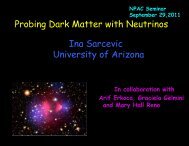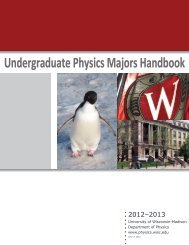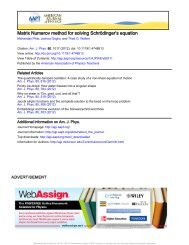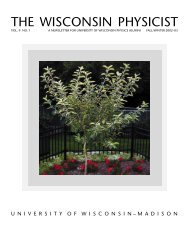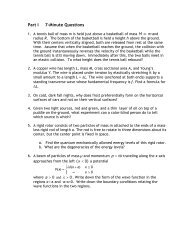T H E W I S C O N S I N P H Y S I C I S T - Department of Physics ...
T H E W I S C O N S I N P H Y S I C I S T - Department of Physics ...
T H E W I S C O N S I N P H Y S I C I S T - Department of Physics ...
Create successful ePaper yourself
Turn your PDF publications into a flip-book with our unique Google optimized e-Paper software.
“During my first year at UW-Madison, I took the Modern<br />
Introduction to <strong>Physics</strong> introductory sequence (247-248)<br />
where I solidified my interest in physics. That year I also took<br />
an astronomy course taught by Dr. Eric Wilcots. The<br />
following two summers I worked with Dr. Wilcots studying<br />
Seyfert galaxies and stellar feedback mechanisms. I also had<br />
the incredible opportunity to help on an observing run at the<br />
WIYN 3.5m telescope at Kitt Peak near Tucson, Arizona. Next<br />
summer I will be participating in a National Radio Astronomy<br />
Observatory REU in Socorro, New Mexico. With guidance<br />
from Dr. Yancy Shirley, I will be searching for pre-proto stellar<br />
cores in molecular clouds.”<br />
“This is my third year at UW-Madison; I will graduate next<br />
year with degrees in astronomy-physics, physics, and<br />
mathematics. The experience has been overwhelmingly<br />
positive, and I have been lucky enough to have wonderful<br />
pr<strong>of</strong>essors and friends. I plan to attend graduate school in<br />
either astronomy or physics.”<br />
Julie Scanlan writes, "I have been attending UW-Madison for<br />
three years, and plan on graduating in spring <strong>of</strong> 2005. My<br />
major is physics, but I am also getting a certificate in<br />
environmental studies. I love both the city <strong>of</strong> Madison and<br />
the UW, which is why my first choice for graduate school is to<br />
stay here. Unable to pick a field <strong>of</strong> physics that holds<br />
particular interest for me,<br />
within the past year I have<br />
found myself more and<br />
more drawn to the earth<br />
sciences for graduate study. I<br />
intend to use this summer to<br />
consider what field <strong>of</strong> study I<br />
want to pursue before I<br />
apply to graduate schools<br />
next fall.”<br />
“When I finish with school, I<br />
would prefer to work in<br />
research at either a university<br />
or for the government.<br />
Julie Scanlan<br />
While I admire areas <strong>of</strong><br />
science that focus primarily on advancing humanity’s<br />
knowledge, my own desire is to aid in research that seeks to<br />
identify and solve serious problems within our world. I am<br />
particularly concerned about the effects that humans are<br />
having on the environment, and would like to focus my<br />
career on studying one <strong>of</strong> the major problems that the planet<br />
will be facing in the coming century.”<br />
Liebenberg Family Undergraduate Summer Research<br />
Fellowship<br />
Our thanks go to the family <strong>of</strong> Maude Liebenberg and her<br />
son, Don. Because <strong>of</strong> their generosity, the Undergraduate<br />
Summer Research Fellowship was available for Joseph<br />
Wildenberg at the May awards banquet. This award provides<br />
funding to encourage undergraduates to become involved in<br />
summer research programs.<br />
Here is the story <strong>of</strong> Joseph<br />
Connell Wildenberg. “As a<br />
wide-eyed middle-school<br />
student, I didn’t know what<br />
to expect when I came to<br />
Madison for a Wisconsin<br />
football game with my<br />
parents. A graduate <strong>of</strong> UW-<br />
Madison, my father took me<br />
on a tour <strong>of</strong> the campus,<br />
specifically Chamberlin Hall.<br />
When I reached the<br />
basement and saw the<br />
Madison Symmetric Torus,<br />
with all its protruding wires Joseph Wildenberg<br />
and intricate machinery, I<br />
made my decision: I will attend this university.”<br />
“Years later, I enrolled as a freshman with the intent <strong>of</strong><br />
majoring in chemistry. It took only a few semesters for me to<br />
realize that it wasn’t chemistry that held my interest. <strong>Physics</strong>,<br />
with its ability to describe just about every physical<br />
phenomenon, was what I wanted to study. I have a wide<br />
range <strong>of</strong> interests and my declared majors are physics,<br />
mathematics, computer science, and molecular biology. I<br />
hope to enroll in an M.D./Ph.D. program which will allow me<br />
to receive a concurrent M.D. and Ph.D. in physics. I would<br />
like to use this knowledge to research the human nervous<br />
system with an emphasis on the supposed quantum<br />
mechanical nature <strong>of</strong> the brain.”<br />
Dr. Maritza Irene Stapanian Crabtree Undergraduate Award<br />
This is the second year <strong>of</strong> this award, which stems from a<br />
bequest by William Crabtree on behalf <strong>of</strong> the late Dr. Maritza<br />
Irene Stapanian Crabtree to the University <strong>of</strong> Wisconsin to<br />
support tuition and fees based equally on merit and need for<br />
undergraduate students in <strong>Physics</strong>. This year’s winners are<br />
Emily Harrison and Aaron Madlon-Kay.<br />
Aaron Madlon-Kay writes, "I fell in love with physics during<br />
my advanced physics class in high school. Although I did not<br />
originally want to take it, the rewards have been well worth<br />
T H E W I S C O N S I N P H Y S I C I S T 17


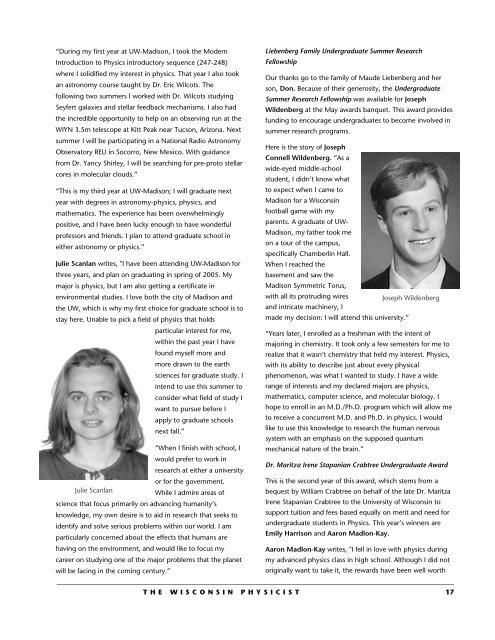
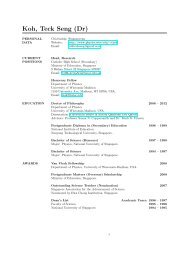
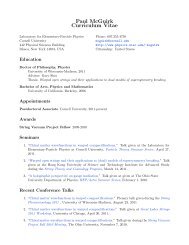
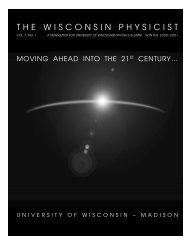
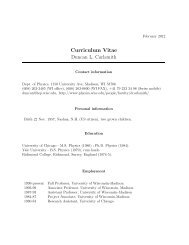
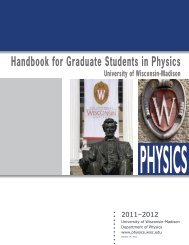

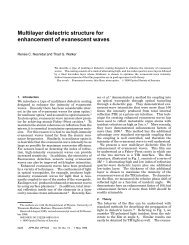
![The Symmetric Linear Potential [ ]](https://img.yumpu.com/25329322/1/190x245/the-symmetric-linear-potential-.jpg?quality=85)
